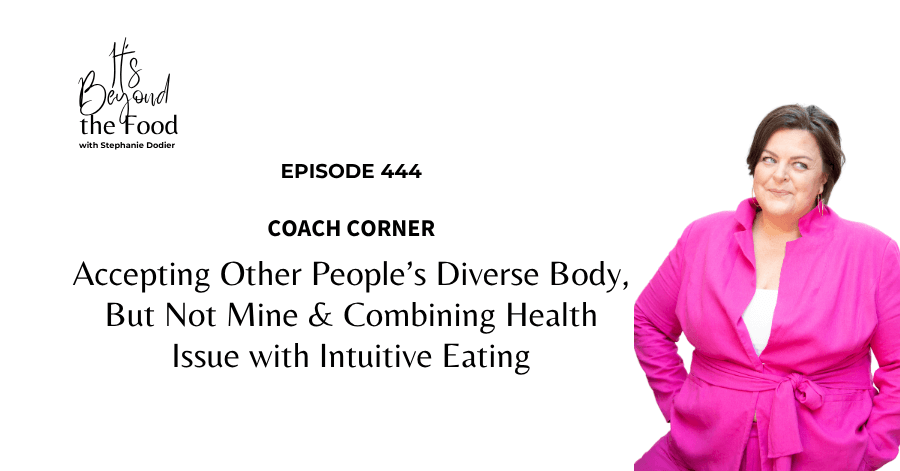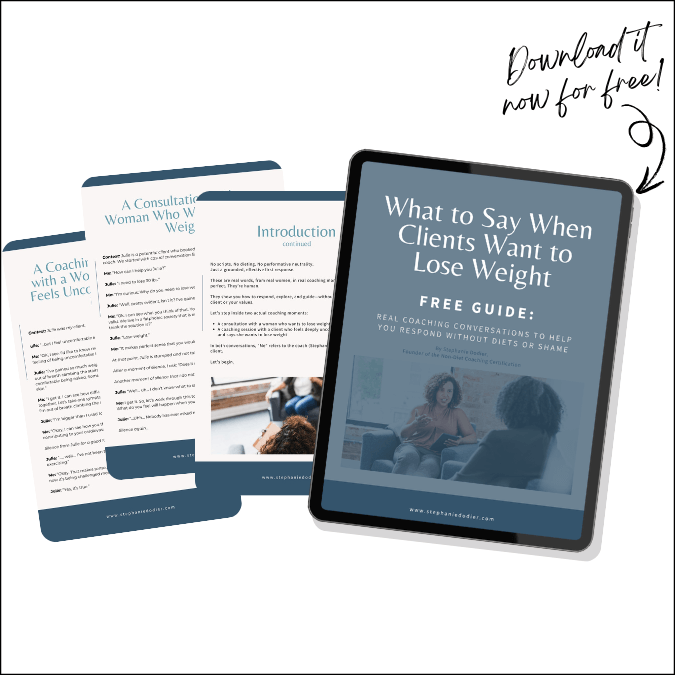

Can You Practice Intuitive Eating with Health Conditions?
In this episode of the Coach Corner series, I answer one of the most common questions I hear: Can clients practice intuitive eating if they have a health condition like diabetes or PCOS?
I also dive into another powerful question: Why is it that clients can admire body diversity in others, but struggle to accept their own body?
These are questions that show up often for coaches learning how to do behavior-based work without falling back into food rules or restriction. If you’ve ever felt unsure how to support clients with medical diagnoses or body image struggles, this episode will ground you in evidence-based answers.
Episode Highlights & Timeline
[0:59] – What’s inside the Coach Corner Vault and how to access it
[1:24] – Can clients with chronic conditions use intuitive eating?
[2:56] – Why restriction backfires, even for health reasons
[5:02] – The first step: assess eating behaviors, not just food intake
[6:14] – How gentle nutrition supports health without restriction
[7:23] – Know your scope and when to collaborate with a dietitian
[8:21] – Final takeaway: intuitive eating and health conditions are not mutually exclusive
[9:03] – Why clients can’t accept their own body, but love others’ bodies
[10:00] – Understanding self-objectification theory and its roots
[11:14] – The impact of external validation and “Good Girl” conditioning
[12:08] – Using the cognitive behavior model to unpack body image beliefs
[13:09] – How to reframe body image using body neutrality and functionality
Mentioned in the show:
Non-Diet Coaching Certification Waitlist
What To Say When Clients Want To Lose Weight Guide
Full Episode Transcript
This transcript was auto-generated and lightly edited for clarity.
Click to expand the full transcript
Why do body image coaching clients accept others’ bodies but not their own?
Clients often accept others’ bodies but not their own because of self-objectification.
They’ve internalized beauty standards and learned to see their body through others’ eyes. This creates constant self-judgment, even if they believe in body diversity.
Coaching helps by shifting focus from appearance to functionality, teaching body neutrality, and rebuilding self-trust.
This mindset shift is key to real, lasting body image change.
[00:00:00] Stephanie: Welcome to It’s Beyond the Food Podcast, my sisters. I’m your host Stephanie, and today we’re back with episode three, of the Coach Corner series. And this series is for all the Health Professional Dietician, nutritionist, therapists, health coaches wanna learn how to coach behavior and mindset without co-opting diet culture.
[00:00:20] Stephanie: Now before we get into answering the two questions for today’s episode, I want to reintroduce you the coach Corner vault, something that we launched on the last episode, which gives you instant access to 50 live mini training that I’ve been doing over the years. On my Instagram account, that allows you to get even further or deeper to the next level into your coaching skillset on, uh, mindset coaching, body image coaching, eating, and also business mindset coaching for you and the growth of your business.
[00:00:59] Stephanie: We’ve [00:01:00] organized it into a downloadable library where you can see the topic that each training focus on, and you can select what you need. In the time that you need it, I think it’s very cool. If you wanna get access to it, you can use the link in the show note. It’s gonna ask you to give your first name and your email address, and then we’ll be able to send you the link to download the library.
[00:01:24] Stephanie: Or you can go to stephanie dozi.com/coach corner. Now let’s dive the two question. Question number one, can client practice intuitive eating with health condition? This is one of the most common question I get from people who are entering the world of weight neutral health and are learning to practice using the intuitive eating framework and are worried that it may not be conducive to health condition, and I’ll take the typical [00:02:00] diabetes PCOS, or any other chronic health condition. And I wanna say it’s totally normal because most of your training be it as a dietician or as a health coach, probably taught you that part of the process of helping people was to restrict certain food.
[00:02:23] Stephanie: And it’s even more prevalent in health coaching circle, where food restriction is the baseline for any health condition. And it’s misunderstanding.
[00:02:34] Stephanie: I’m gonna give you the answer. Intuitive eating is conducive to any client, any patient that you have in any health condition that they may have, because simply put the intuitive eating process as a 10 principle that have been put together in order to reestablish normal eating pattern.
[00:02:56] Stephanie: That’s all it is, It’s leading your [00:03:00] client back to have normal however, we define normal, have normal human eating behavior to heal. Transform their disordered eating pattern, learn from diet culture into the normal, average human being eating behavior. So with that in mind, intuitive eating is just a process that people go through to reacquire normal eating behavior. Now. Where there’s a little bit of education that needs to be given to people who are new to this process is that what is believed to be the solution of restricting certain food for certain health condition actually is not conducive when we look at eating behavior.
[00:03:49] Stephanie: Here’s what I mean by that. When we restrict food for noble reason, like health issue or for aesthetic reason, like [00:04:00] for weight loss is irrelevant to the human nervous system and brain. It doesn’t make a difference why you restrict food. It’s still a food restriction that will be perceived by both the brain and the nervous system as a threat and leads to disordered eating behavior like binging, like food noises, like any type of eating, past fullness, craving food that are being restricted.
[00:04:35] Stephanie: So. When we prescribe food restriction for certain health condition, it is not sustainable treatment or protocol that you’re giving your client because they will not be able to sustain those behavior. Now, I generalize here most people, nine people outta 10 will not be able to sustain those health, those [00:05:00] eating pattern behavior .
[00:05:02] Stephanie: So what do we do instead? That’s where intuitive eating comes in. The first thing we need to assess our client’s eating pattern, right? That you use the til a intuitive eating assessment or that you use our simplified assessment, which we, by the way, can provide for free. If you go into the show note, you will see you can grab our non.
[00:05:23] Stephanie: Assessment tool for free. The first thing you need to do with any client is assess their eating behavior and understand if they are in a disordered state of eating or they are in a normal state of eating. Chances are if they’re coming to you, they’re probably demonstrating some level of disordered eating behavior.
[00:05:42] Stephanie: And that’s where intuitive eating process comes in to reestablish connection to hunger, fullness, and satisfaction. Cue. To neutralize all food, remove the good or bad food label, which leads to the food noises. And then towards the end of the [00:06:00] process of intuitive eating, that’s when we can access gentle nutrition, which does include guidance, recommendation to manage certain food based on the health condition.
[00:06:14] Stephanie: So for an example, I’ll take the classic case of diabetes where we take a lens of combination when we combine carbohydrate with a fat or, and or a protein, we reduce the impact of the carbohydrate on the blood sugar, which is an approach that is sustainable because it doesn’t restrict carbohydrate like most protocol for diabetes will do for the client, making it unsustainable and creating a lot of food noises and.
[00:06:49] Stephanie: Emotional disruptance for your client. So when we’re taking an intuitive eating approach, we’re resetting the baseline on hunger full and [00:07:00] satisfaction, and we are taking specific approach that are included in a gentle nutrition approach.
[00:07:05] Stephanie: Now, before we leave this topic, I ought to mention that you wanna work within your scope of practice. Meaning if you are not a licensed practitioner who is capable of providing medical nutrition counseling, you should not be doing.
[00:07:23] Stephanie: So this is when we work in collaboration with a registered dietician who specialize in medical nutrition, who can advise based on the specific condition of the client or the patient, which food should be addressed within the concept or the constraint of gentle nutrition. If you study with me, we teach gentle nutrition in a pyramid kind of framework and we call individual food specification the top of the pyramid.
[00:07:58] Stephanie: So there’s many other layer of [00:08:00] gentle nutrition we can access before we get into food specific advice based on the health condition. And this is when a registered dietician will come in and be able to provide very specific advice for the health condition of your client.
[00:08:15] Stephanie: So the takeaway for this first question is that intuitive eating and health condition are not mutually exclusive.
[00:08:21] Stephanie: Coaches and client needs to work together to neutralize all food and build self-trust through the intuitive eating process so that they can make food choices that are rooted in care for themselves. That’s how we can support health without recreating diet culture and food restriction.
[00:08:43] Stephanie: Question number two, why is it that certain client can accept other people, diverse body, but not their own? And I often sound like this from a client. I see other women in larger body, and I find them beautiful, but there’s [00:09:00] no way I can feel that about myself.
[00:09:03] Stephanie: To understand this gap, we need to turn into the self-objectification theory, which is a psychological process where a person view themself as a physical object first before being a human being.
[00:09:19] Stephanie: And this is something that is very prevalent in people self-identified as women, which are constantly exposed to the thin ideal, to the social media, to marketing messages that sexualize a woman’s body. And we learned that at a very young age. Sometime as early as five or six years old girl learn to see themself through the lens of a sexual body and through the lens of the opinion of other in the self-objectification theory that’s referred as the observer gaze.
[00:09:59] Stephanie: [00:10:00] And we internalize this message and we start associating our value are often referred to as our self-esteem based on our appearance and to protect ourselves.
[00:10:12] Stephanie: We begin monitoring how other people see us. And this is why your client can celebrate body diversity in others yet still criticize their own because their self concept often referred as their self-esteem is built on external approval, not their internal approval or their internal self-worth.
[00:10:44] Stephanie: In a recent episode, and I’m gonna quote the number, I think it’s episode 440, I did an entire unpacking of what is known as the Good Girl Syndrome, where I explained the concept of socialization [00:11:00] and how women are socialized to be women in a patriarchal society.
[00:11:05] Stephanie: Whereby we see our self-worth as being attached to our body and how other people think of us.
[00:11:14] Stephanie: So self-objectification is a behavior that happened predominantly cognitively, where people think about themselves as an object, not as a human being. Through self-criticism, maintain this objectification that they have for their own body, yet capable of seeing other women as beautiful human being in diverse body.
[00:11:39] Stephanie: So two things that you can do. Number one, understand the self-objectification theory yourself and explain it to your client. And unpack what we call their unintentional mindset model around their body, where you ask questions to discover what they think about their [00:12:00] body, how they view their body based on their self-worth, what they think of other people’s opinion about their body, how that makes them feel.
[00:12:08] Stephanie: We unpack their emotion and then we also unpack how they react when they’re being judged around their body, when people make comment, how they feel when they go out into the world and how they behave towards themselves. That’s what we call the unintentional cognitive behavior model. Through query and coaching question, we can quickly drawn up how their behavior towards their body is fueled by their self objectification, and we show it to them.
[00:12:40] Stephanie: This is what we call presenting their unintentional model that fuels their current behavior, where we can explain to your client what is happening. So show to your client how self-objectification shows up into their life. And then number two, this is why I love body neutrality [00:13:00] where we reframe the relationship of your client to their body from a place of functionality instead of beauty.
[00:13:09] Stephanie: That’s the foundation of body neutrality where we reshape our belief system around functionality.
[00:13:17] Stephanie: When we take the lens of body functionality, this is when we shift from our body being an object to being an instrument, an instrument for us to experience the life to our five senses, to the extent that we are capable of.
[00:13:35] Stephanie: So each time your client can reframe an objectification thought an ex. Experience of self-objectification to one of functionality. That’s how over time they’re gonna build a new belief system around their body image.
[00:13:57] Stephanie: So if I was to give you a [00:14:00] takeaway for this question is the understanding of the self-objectification theory and how it explain why your client can accept other people’s diversity in body but not their own. Explaining that, teaching that to your client. Also, showing them through the cognitive behavior coaching model, how this impact their behavior towards themself, their self-criticism towards the ability to care for their body and introducing them to body function, valuing instead of beauty valuing.
[00:14:33] Stephanie: That’s how we move our client from self-judgment to self-trust.
[00:14:38] Stephanie: If this is the kind of coaching you want to master, one that is rooted in behavior, self-trust, using the non-AI coaching framework. This is what we teach inside of the non-AI coaching certification, and I invite you to join the wait list for the next cohort in early 2026.
[00:14:57] Stephanie: Until next time, my sister coach [00:15:00] behavior not bodies, and I’ll see you on the next episode.
[00:15:08] wanna coach behaviors, not bodies. Learn the mindset tool and the method that create real changes.
[00:15:16] Join the wait list for the next cohort of the non diet coaching certification at stephaniedodier.com/waitlist. That’s where the real training begins, and I’ll see you on the other side, my sisters.







